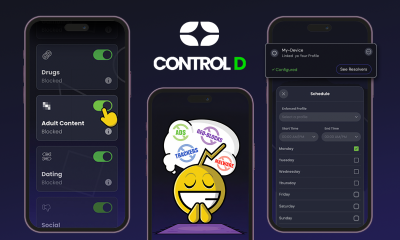Personal Finance
How to get rid of credit card debt

Our goal here at Credible Operations, Inc., NMLS Number 1681276, referred to as “Credible” below, is to give you the tools and confidence you need to improve your finances. Although we do promote products from our partner lenders who compensate us for our services, all opinions are our own.
Credit card debt is common for many Americans. The average consumer had $5,805 in credit card debt in the fourth quarter of 2022, according to the most recent report from TransUnion. Collectively, credit card balances in the U.S. totaled $930 billion during that period.
If you’re wondering how to get rid of credit card debt, know that you can take steps to eliminate it. You can use a balance transfer credit card or a credit card consolidation loan, among other options.
Consider a balance transfer credit card
A balance transfer credit card allows you to move one or more outstanding credit card balance(s) to a new credit card. Some balance transfer cards charge an initial fee, which may be a set amount or a percentage of the amount that you’re transferring. But many balance transfer credit cards have a 0% APR introductory period up to 15 or 18 months. During this period, you can pay down your credit card debt without paying any interest.
Once the introductory period is over, the interest rate on the credit card will change to its normal rate, which could be higher than what you’re paying for your current credit card. So, utilizing the promotional period to ideally pay off all your debt and avoid any interest can be helpful.
Also, consider if the balance transfer fee is too high to be worth moving your credit card balances to a new card. If you decide a balance transfer credit card is right for you, you can start comparing cards — many major credit card issuers offer balance transfer cards.
Pros:
- Opportunity to pay off debt with no interest during the introductory period
- Makes paying off debt more manageable, since you only have one payment instead of several
Cons:
- Possibly high balance transfer fee, especially if you’re transferring a large balance
- Will have to pay interest on any new purchases you make with the balance transfer card until you pay everything off (including your transferred balance)
Use a credit card consolidation loan
A credit card consolidation loan, or debt consolidation loan, lets you take all your credit card balances (and even other types of loans) and combine them into one personal loan. This loan has a fixed interest rate and new repayment term. Instead of having to deal with several monthly payment amounts and different interest rates, you’ll have one monthly payment.
You can get credit card consolidation loans from online lenders, banks, and credit unions. Debt consolidation loans can be ideal for high-interest credit card debts, since personal loans typically have lower interest rates than credit cards.
When you reduce your interest rate, more money from your payment will go toward paying down the actual credit card balance. However, it’s important to also consider a lender’s fees and repayment terms. Many personal loans come with origination fees (the cost of processing your loan application) and prepayment penalties (a fee for paying off your loan early). The cost of these fees could outweigh the benefits of the loan. In addition, if you have a longer repayment term, you’ll have a lower monthly payment but pay more in interest over the life of the loan.
Pros:
- May lower your interest rate
- Fixed repayment term, which helps you understand exactly when you’ll be out of debt
Cons:
- May not qualify for a lower rate
- Fees can add up
With Credible, you can easily compare rates on debt consolidation loans in minutes, without affecting your credit.
Negotiate with your credit card company
If you’re looking to pay off credit card debt faster, you can always try negotiating with your credit card company. Refer to your monthly statement to see what your current APR is for the credit card, then call your credit card issuer.
You can ask if they’re willing to lower your interest rate or create a modified payment plan for you. You may be able to set up a forbearance agreement where you can temporarily stop making payments (though interest may still accrue). A long-term repayment plan is another option — if your credit card company agrees, you may be able to negotiate a repayment plan with little or no interest.
The ideal time to negotiate with your credit card issuer is after a period of on-time payments. A history of at least 12 to 24 consecutive on-time payments may increase your chances of negotiating a lower rate or repayment plan with your credit card company. When you call a creditor, make sure you ask for a manager or supervisor who can grant your request. A customer service representative may not have the authority to make any changes to your account.
Negotiating with your credit card company doesn’t always work, but it’s worth asking if it’s possible.
Pros:
- Could get a lower interest rate
- May get a modified payment plan that can help you recover financially
Cons:
- Credit card issuer may not lower your interest rate
- Less likely to negotiate successfully if you haven’t been making consistent payments
Understanding credit card debt
You can use a credit card to pay for almost everything, from groceries to gas. But this convenience comes at a cost — if you don’t pay off your balance in full each month, the credit card company will charge interest on what you owe.
The interest you pay is typically a percentage of your card’s balance, so the more that balance increases (as you make more purchases), the more interest you’ll be charged. And carrying balances on multiple cards can make your debt grow even faster.
Many credit card issuers calculate your interest each day based on your average daily credit card balance. This means the sooner you pay off your credit card balance — even just part of it — the less interest you’ll pay. The more your interest piles up, the more your credit card debt snowballs, making it harder to pay off.
Credit card debt can also negatively impact your credit score. A large portion of your credit score — 30% — is based on your credit utilization, which compares your credit card debt to your total credit card limit. If you have multiple cards, it’s the sum of their limits.
For example, if you have $5,000 in credit card debt and your credit card limit is $7,500, your credit utilization ratio is 67%. Carrying credit card balances that exceed 30% of your available credit could cause your credit score to go down, since it indicates that you’re close to maxing out your cards and may not be managing your money well.
Credit card debt FAQs
Here are the answers to some of the most commonly asked questions about credit card debt.
How much credit card debt can I consolidate?
This depends on the credit card issuer (if you’re using a balance transfer credit card) or the personal loan lender (if you’re taking out a debt consolidation loan). For a balance transfer card, the limit may be the card’s credit limit, or your card may have a specific balance transfer limit that’s even lower.
Each personal loan lender has its own requirements, but you may be able to consolidate up to $50,000 or even $100,000. Keep in mind that many lenders also require a minimum loan amount, like $2,500, though some may go as low as a few hundred dollars. Be sure to find out if a lender can provide enough funds before applying for a loan.
How do I prioritize which debts to pay off first?
You can prioritize any debt you want, but there are two debt management strategies you may find useful. One is the debt snowball method, where you pay off the debt with the smallest balance first while making the minimum payment on your other credit cards. Once your smallest debt is paid off, you can move on to paying off the next-lowest balance. This method can keep you motivated as you continue to knock out your balances.
Another option is the debt avalanche method, where you prioritize the credit card with the highest interest rate. Once that one’s paid off, you pay off the card with the next-highest interest rate. This method may help you save more in interest over time.
Should I consider debt settlement?
Debt settlement companies may claim that they can negotiate your debt with a creditor so you pay less than you owe. But working with these companies can be risky, since they may charge high fees or tell you to stop repaying your debt altogether, which may put you in even more debt.
Debt settlement companies may not be able to settle your debt, and working with them could negatively impact your credit if you stop making your debt payments. Instead of using debt settlement companies, consider talking to a credit counselor from a nonprofit organization, like the National Foundation For Credit Counseling.
If you’re ready to tackle your credit card debt, visit Credible to compare rates on debt consolidation loans.
Read the full article here

-

 Personal Finance6 days ago
Personal Finance6 days agoGas prices drop as demand for driving fizzles out: AAA
-

 Investing6 days ago
Investing6 days agoCrowdstrike CEO Responds to Causing Largest IT Outage in History
-

 Side Hustles6 days ago
Side Hustles6 days agoHow to Build A Startup, From an Early Lyft, Twitch Investor
-

 Passive Income4 days ago
Passive Income4 days agoNLRB Drops Expanded Joint Employer Appeal
-

 Passive Income6 days ago
Passive Income6 days agoThe Top 5 AI Tools That Can Revolutionize Your Workflow and Boost Productivity
-

 Side Hustles6 days ago
Side Hustles6 days agoJake Paul: Mindset Hacks, Mike Tyson Fight, Embracing Fear
-

 Investing7 days ago
Investing7 days agoBoeing to supply E-7 in first major win since plea deal By Reuters
-

 Side Hustles5 days ago
Side Hustles5 days ago10 Effective Growth Marketing Strategies for Your Startup


















